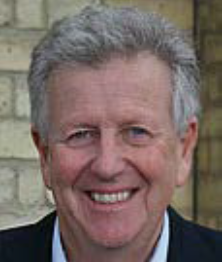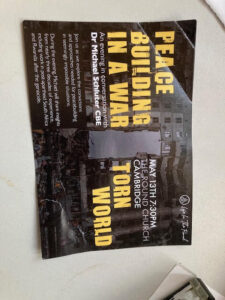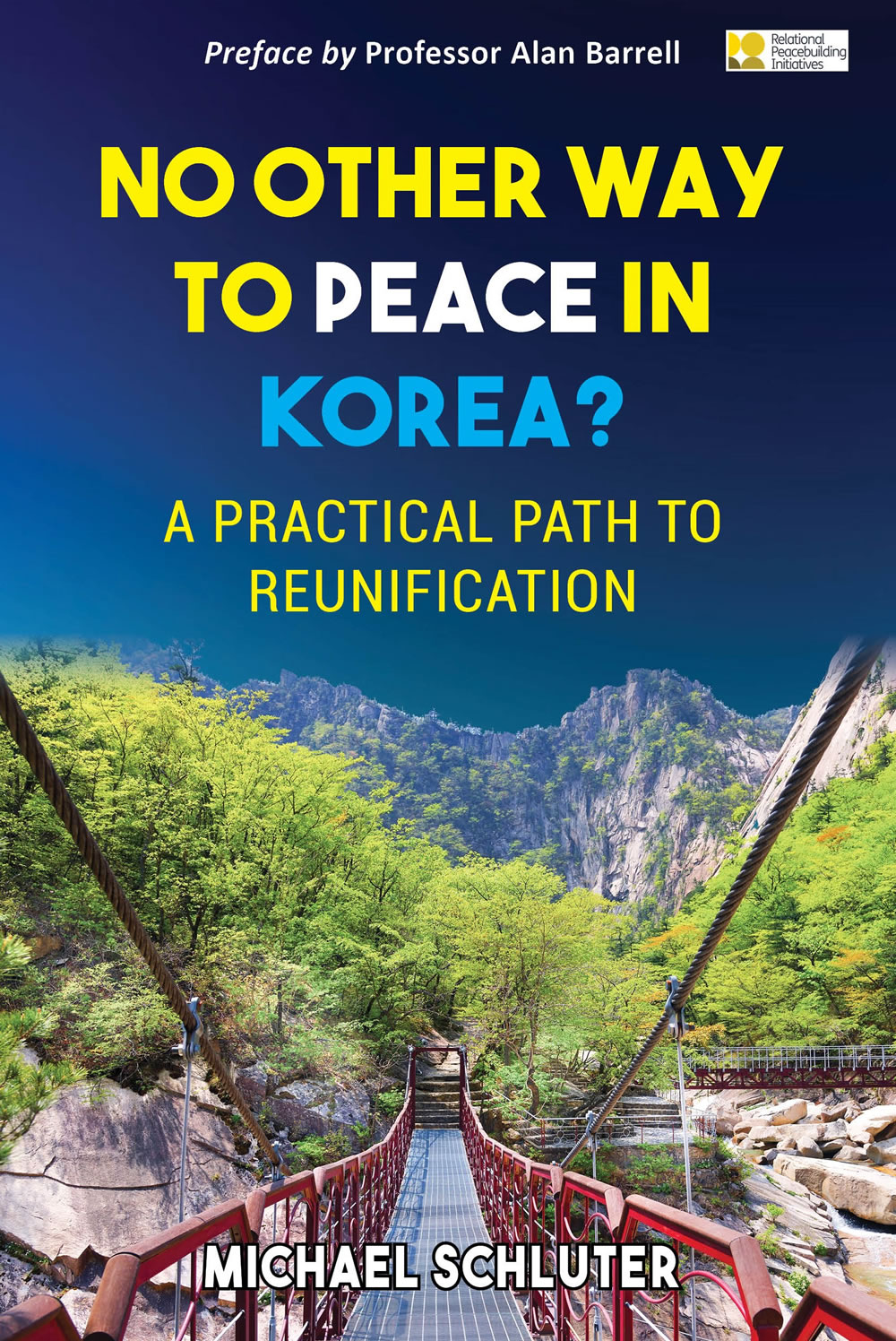About Author

DR MICHAEL SCHLUTER is a thought leader, seminal author, outstanding communicator, and social entrepreneur.
Since the publication of his first book, The R Factor (1993), ten different organizations have been founded as a result of his work, ranging in their focus from research to debt, from education to unemployment, and from peace-building to public policy.
HM The Queen recognized his outstanding contributions and achievements by awarding him the honour of a CBE in 2009.
__
Distributed worldwide by Salt Desert Media Group Ltd.
Further information: Mr Prabhu Guptara, +44 (0)753 581 5179
prabhusguptara@gmail.com
Information associated with No Other Way to Peace in Korea?, potentially of interest to readers:

Opinion pieces by Michael Schluter (writing with others)
Looking at the future of China-UK ties
Pelosi’s Taiwan visit ill-advised and provocative
Articles, Reviews, Interviews, and Mentions
8 December 2022 – article in The Korea Times: “British peacemaker presents idea to break stalemate in Korea”
Aired globally on 7th December 2022: interview with Dr Michael Schluter on Arirang TV (South Korea).
“By attempting to circumvent intractable divisions over denuclearization between rival states on the Korean peninsula, Michael Schluter has provided a unique roadmap aimed at achieving unity and transformation. The core elements of the strategy involve a relational approach that takes into account state roles by promoting “mutually convergent development” at a community and commercial level with a goal of restoring and deepening trust. The key lies with the establishment of mutually beneficial community-based relationships aimed at addressing the peninsula’s most difficult economic, political, and security challenges. It is a thought-provoking approach to one of the world’s most enduring security flashpoints” – Scott Snyder, co-editor, North Korea’s Foreign Policy: The Kim Jong-Un Regime in A Hostile World; Senior Fellow for Korea Studies, Council on Foreign Relations, USA
“Michael Schluter draws on experience and perspective gleaned in other deeply fractured contexts to helpfully analyze one of the most complex and painfully vexing challenges of our time – reconciliation on the Korean Peninsula. In his thoughtful exploration of the different systems, sectors and worldviews of North and South Korea, he offers mutual pathways to rebuild trust and relationships from the grassroots, while acknowledging that real hope for lasting transformation and healing – individually or nationally – depends on forgiveness and reconciliation” – Heidi Linton, Executive Director, Christian Friends of Korea
“This insightful book presents a vision for change, but more significantly, it charts a pathway through five phases of mutual convergent development through which lasting change could be realised. Focused on how multi-dimensional relationships – economic, political and social – between North and South Korea could be practically developed, this book’s proposals are based on decades of thought and action about applying a relational approach – which offers hope for a different future for the Korean people and their countries, and for us all” – David Nussbaum, Former CEO of Transparency International, of WWF-UK, and of The Elders
“Efforts to build peace between North and South Korea by a non-governmental organization is unique. Even more unique is its approach. This book sets out a different, non-nuclear, way of thinking about how to achieve peace in the Korean peninsula. In particular, it puts forward making the agriculture sector the starting point. In many countries, agriculture has been the key to economic transformation. It offers a step by step, effective way to start the process of Korean reunification” – Dr Uma Lele, President of the International Agricultural Economic Association; earlier, Co-chair of the International Taskforce of the China Council on Environment and Development of Forests and Grasslands, China.
“For many centuries, conflicts were resolved by force, relations between states were built on rivalry and confrontation, desire to subjugate an opponent, control and exploiting the weaker and defeated. Such policies are based on the ideology of superiority, on non-recognition or belittling of other cultures, traditions, moral principles and values. That system of relations not only exists to this day, but still dominates international affairs.
However, another approach to solving international problems is gaining strength in the world. That is the new worldview based on the recognition of the uniqueness of world cultures, great civilizations, their right to their own special path of development and their own culture and history. This worldview involves resolving conflicts through dialogue, based on respect, trust, partnership and mutual understanding, by developing mechanism for resolving contradictions that separate people, states, civilizations.
The new worldview is based on the recognition that at the heart of all world religions and philosophies, universal human civilization lies the common moral principle: “Do what you want to be done towards you.” This old moral principle is the genetic code of the worldview, the approach to conflict resolution that is presented in Michael Schlueter’s book No Other Way to Peace in Korea? A mutual and practical path to reunification.
Rebuilding international relations based on the Relational Thinking requires not only politicians, businessmen and public figures who share and believe in new ideas, but also requires practical recommendations, solutions, “the practical path”, technologies for applying new thinking in conflict resolution. It is this technology that has been developed and proposed by Michael Schlueter in his book focusing on Korea, which was divided in 1945 into two ideologically, economically and politically hostile states.
One of the main advantages of the book is that Michael Schluter offers the detailed specific mechanism, technology for overcoming the split, and for solving the economic, political and humanitarian problems of divided Korea, taking development of agriculture (that requires the most urgent solution) as starting point, as basic support in overcoming the split and enmity.
The division of Korea was the result of war caused not so much by internal as by external causes, including the influence of world powers and ideologies. The restoration of the unity of Korea should become the task in which the world community, primarily leading powers of the world – the United States, the EU, Russia, China and Japan, that played major role in the division of Korea, should take part.
However, the significance of Michael Schlueter’s book goes beyond the Korean peninsula. It offers the methodology, path, technology, system for resolving contradictions and conflicts that can be applied to solve other problems in the world that have accumulated and have not been resolved for decades and centuries and continue to be created by those who are still trying to resolve conflicts by force, who looks at the world from position of confrontation and possibility of achieving peace only through struggle “to the end” – Valery Morozov, Author, Political Analyst, and former Director General of Information and Analytics, Novosti-Inkomm Press Agency, Moscow
“Among many publications I have read suggesting solutions to a very complex problem of reunification of Korea I found this book is one of the best. In particular, the step-by-step approach, as well as emphasizing the importance of forgiveness and reconciliation, are what I liked most.
Two short programs were shown frequently on Central TV of North Korea during my stay in Pyongyang for more than 17 years:
1) Assassination of Gaddafi after Libya gave up her nuclear program and
2) Double standards of the Western world towards the launching of a satellite in North and South Korea, accusing the North for attempting to develop ICBMs but applauding the South for a successful launching.
Many North Korean Government officials and citizens believe that denuclearization of their country would bring the same result as Libya unless the safety of their political system is guaranteed.
I fully agree that the proposals of Relational Peacebuilding Initiatives described in this book would provide a practical path to reunification of Korea. I strongly recommend that not only administrators, citizens and students of both Koreas, but all people interested in world peace read this book” – Professor Chan-Mo Park, Ph.D., Former President, Pohang University of Science and Technology, South Korea; former Chancellor, Pyongyang University of Science and Technology, North Korea
“The Korean Peninsula has remained the only divided country since World War II. It has become a symbol of geopolitical conflict and the consequences of ideological differences. The division is not merely a Korean problem. With the rise of China and the newly developing ‘Second Cold War’, order, peace and reunification of the Korean Peninsula would be a significant turning point for the peace of the whole of humanity.
“This book includes excellent and actionable future-oriented proposals for a peace and reunification process on the Korean Peninsula, whereas currently no practical and durable solution is obvious.
“From my perspective, the outstanding features of this book are as follows:
• Discussions about unification have previously been held primarily between North Korean and South Korean parties. However, Dr Schluter, as a British citizen, acknowledges the perspectives of both Koreas regarding unification and suggests realistic solutions and processes from a neutral and objective standpoint.
• As the author emphasizes, a reunification process based on mutual respect is crucial. Based on this presupposition I believe his proposal provides a suitable starting point.
• Dr. Schluter explains how Europe ended wars between its member states, resolved conflicts after World War II, and developed into the European Union. He has demonstrated the relevance of the European experience as an example of how a gradual process towards peace in the Korean Peninsula could unfold.
• Discussion about Korean unification has previously been based on a top-down approach to socio-political integration which encountered huge barriers due to the ideological differences of the two Koreas. In contrast this book proposes a five-step process, that gradually develops from a low-level economic community, as a fresh approach through a strategy that slowly builds trust.
An essential feature of this process is a relationship-centred focus based on the fundamental historical values of South and North Korea. This is innovative in that it aims to create a relationship-oriented society as the basis for reunification.
“I first met Michael when I was the head of the Center for Unified Korea at Handong Global University. I have kept in touch with him continuously for five years and found him to have a deep passion for reunifying the Korean Peninsula and a sincere heart for both Koreas. Moreover, in light of his contribution to the peace process in South Africa, I have confidence that he has the experience and credibility to put forward proposals for a Korean Peninsula peace process.
“I am sure his book will guide us in a new direction for our thinking about unification of the Korean Peninsula. In addition, I believe his book will also make a valuable contribution to world peace” – Dr Young Chun Park, General Director, Korea Reunification Center, Handong Global University, Korea
“A human relational approach is the key – and indeed the only – path forward for peace in the region and in the wider world. On that basis, the World Council of Churches has been engaged for almost 40 years in promoting dialogue and engagement for peace and reconciliation on the Korean Peninsula, between North and South Koreans, and between Koreans and their sisters and brothers around the world. Militaristic confrontation and isolation only exacerbate the risks of potentially catastrophic conflict. We hope that the publication of Dr Michael Schluter’s No Other Way to Peace in Korea? will encourage many others to seek peace through dialogue and encounter as fellow human beings in the Korean Peninsula, and to help break down the barriers of confrontation and mutual enmity” – Rev. Prof. Dr Ioan Sauca, Acting General Secretary, World Council of Churches
“Throughout his distinguished career Michael Schluter has shown how it is possible to adopt relational peacebuilding initiatives in many different locations around the world. He has established a formidable reputation as someone who can address complex issues and provide feasible, well-thought-out proposals. The essence of his approach is that progress is best made by adopting a ‘bottom-up’ approach to problems that builds on the belief that ‘relationships. personal and organisational, are the key to creating lasting stability for any region’s political system and for its economic growth’. In his new book, No Other Way to Peace in Korea? A Mutual and Practical Path to Reunification, Michael sets out a five-phase process that would enable the building of trust and commitment at ‘sectoral levels of public policy’ between North and South Korea. He defines this process as ‘Mutual Convergent Development’.
Based on extensive research the book shows how it might be possible to initiate a reunification process by creating in the first phase a Korean Peninsula Agricultural Community (KPAC) which by building on best practice from around the world could evolve into a Korean Peninsula Economic and Social Community that could align existing enterprise and financial institutions to the mutual benefit of all parties concerned. In this way, over time, progress could be made in harmonising social relations and levels of trust between North and South Korea that might then lead to a confederation of the current North Korean and South Korean administrations with responsibilities divided between different levels of regional government. This is a book that will be widely read and offers new, and well-researched, proposals to help to bring about lasting peace in the Korean Peninsula” – Peter Tyler, Emeritus Professor, Department of Land Economy, University of Cambridge, U.K.
‘Pyongyang will walk the path to peace when there is in the balance something positive for them. Too often the only demand is denuclearisation by carrot or stick. Refreshingly Michael Schluter does not make that mistake in No Other Way to Peace in Korea? His innovative approach looks at breaking the current impasse on the basis of mutual convergent development. It’s never been tried. It might just work’ – Glyn Ford, Former Member of the European Parliament; author of ‘Talking to North Korea’


Admin –
For many centuries, conflicts were resolved by force, relations between states were built on rivalry and confrontation, desire to subjugate an opponent, control and exploiting the weaker and defeated. This policy is based on the ideology of superiority, on non-recognition or belittling of other cultures, traditions, moral principles and values. That system of relations is not only present, but still dominates international affairs.
However, another approach to solving international problems is gaining strength in the world. That is the new worldview based on the recognition of the uniqueness of world cultures, great civilizations, their right to their own special path of development and their own culture and history. This worldview involves resolving conflicts through dialogue, based on respect, trust, partnership and mutual understanding, by developing mechanism for resolving contradictions that separate people, states, civilizations.
The new worldview is based on the recognition that at the heart of all world religions and philosophies, universal human civilization lies the common moral principle: “Do what you want to be done towards you.” This old moral principle is the genetic code of the worldview, the approach to conflict resolution that is presented in Michael Schlueter’s book No other way to peace in Korea? A practical path to reunification.
Rebuilding international relations based on the Relational Thinking requires not only politicians, businessmen and public figures who share and believe in new ideas, but also practical recommendations, solutions, “the path”, technologies for applying new thinking in conflict resolution. It is this technology that was developed and proposed by Michael Schlueter in his book on the example of Korea, divided in 1945 into two ideologically, economically and politically hostile states.
One of the main advantages of the book is that Michael Schluter offers the detailed specific mechanism, technology for overcoming the split and solving the economic, political and humanitarian problems of divided Korea, taking development of agriculture that requires the most urgent solution, as starting point, as basic support in overcoming the split and enmity.
The division of Korea was the result of war caused not so much by internal as by external causes, including the influence of world powers and ideologies. The restoration of the unity of Korea should become the task in which the world community, primarily leading powers of the world – the United States, the EU, Russia, China and Japan, that played major role in the division of Korea, should take part.
However, the significance of Michael Schlueter’s book goes beyond the Korean peninsula. It offers the methodology, path, technology, system for resolving contradictions and conflicts that can be applied to solve other problems in the world that have accumulated and have not been resolved for decades and centuries and continue to be created by those who are still trying to resolve conflicts by force, who looks at the world from position of confrontation and possibility of achieving peace only through struggle “to the end.
– Valery Morozov, Author, Political Analyst; former Director General of Information and Analytics Novosti-Inkomm Press Agency, Moscow
09.08.2022